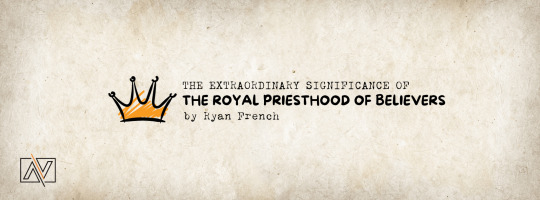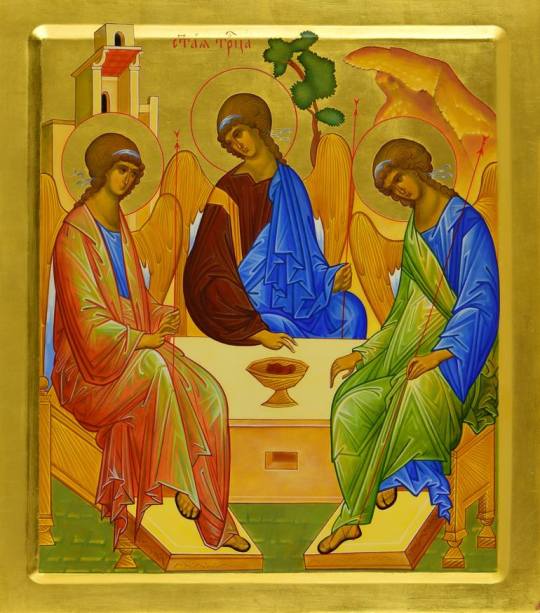#Why I am a oneness apostolic pentecostal not a Trinitarian
Explore tagged Tumblr posts
Text
The Extraordinary Significance of the Royal Priesthood of Believers
This doctrine impacts every area of your life!
The apostle Peter makes a somewhat shocking declaration about the Christian life in the second chapter of his first epistle. Well, actually, he makes several fascinating declarations, but for now, we’ll mainly focus on one. With all its implications, contemporary Christians largely ignore this doctrine. The current religious atmosphere of flagrant biblical illiteracy probably explains why most…

View On WordPress
#Did Constantine invent the Trinity#Does God Care How We Dress#how are we a holy priesthood#how do we present our bodies a living sacrifice unto God?#how does the Bible define modesty?#how to be born again#is the trinity true#should christians dress modestly#what are spiritual sacrifices#what is a royal priesthood#what is christian ordination#what is the priesthood of believers?#what is the sacrifice of praise#why do catholics have priests?#why do pentecostals wear skirts below the knee#Why I am a oneness apostolic pentecostal not a Trinitarian#Why I&039;m not a Trinitarian
0 notes
Text
Saints&Reading: Sun., June 7, 2020
Feast of the Holy Trinity

Eastern Orthodox theology is the theology particular to the Eastern Orthodox Church. It is characterized by monotheistic Trinitarianism, belief in the Incarnation of the essentially divine Logos or only-begotten Son of God, a balancing of cataphatic theology with apophatic theology, a hermeneutic defined by a polyvalent Sacred Tradition, a concretely catholic ecclesiology, a robust theology of the person, and a principally recapitulative and therapeutic soteriology.
Ecclesiology[
The Eastern Orthodox Church considers itself to be the one, holy, catholic and apostolic church established by Christ and his apostles. For the early years of the church, much of what was conveyed to its members was in the form of oral teachings. Within a very short period of time traditions were established to reinforce these teachings. The Eastern Orthodox Church asserts to have been very careful in preserving these traditions. When questions of belief or new concepts arise, the Church always refers back to the original faith. Eastern Orthodox see the Bible as a collection of inspired texts that sprang out of this tradition, not the other way around; and the choices made in forming the New Testament as having come from comparison with already firmly established faith. The Bible has come to be a very important part of "Tradition", but not the only part.
Likewise, the Eastern Orthodox Church has always recognized the gradual development in the complexity of the articulation of the Church's teachings. It does not, however, believe that truth changes, and it therefore always supports its previous beliefs all the way back to what it holds to be the direct teachings from the Apostles. The Church also understands that not everything is perfectly clear; therefore, it has always accepted a fair amount of contention about certain issues, arguments about certain points, as something that will always be present within the Church. It is this contention which, through time, clarifies the truth. The Church sees this as the action of the Holy Spirit on history to manifest truth to man.
The Church is unwavering in upholding its dogmatic teachings, but does not insist upon those matters of faith which have not been specifically defined. The Eastern Orthodox believe that there must always be room for mystery when speaking of God. Individuals are permitted to hold theologoumena (private theological opinions) so long as they do not contradict traditional Eastern Orthodox teaching. Sometimes, various Holy Fathers may have contradictory opinions about a certain question, and where no consensus exists, the individual is free to follow his or her conscience.
Tradition also includes the Nicene Creed, the decrees of the Seven Ecumenical Councils, the writings of the Church Fathers, as well as Eastern Orthodox laws (canons), liturgical books and icons, etc. In defense of extrabiblical tradition, the Eastern Orthodox Church quotes Paul: "Therefore, brethren, stand fast, and hold the traditions which ye have been taught, whether by our spoken word, or by our epistle." (2 Thessalonians 2:15). The Eastern Orthodox Church also believes that the Holy Spirit works through history to manifest truth to the Church, and that He weeds out falsehood in order that the Truth may be recognised more fully.
Eastern Orthodoxy interprets truth based on three witnesses: the consensus of the Holy Fathers of the Church; the ongoing teaching of the Holy Spirit guiding the life of the Church through the nous, or mind of the Church (also called the "Universal Consciousness of the Church"[1]), which is believed to be the Mind of Christ (1 Corinthians 2:16); and the praxis of the church (including among other things asceticism, liturgy, hymnography and iconography).
The consensus of the Church over time defines its catholicity—that which is believed at all times by the entire Church. St. Vincent of Lerins, wrote in his Commonitoria (434 AD), that Church doctrine, like the human body, develops over time while still keeping its original identity: "[I]n the Orthodox Church itself, all possible care must be taken, that we hold that faith which has been believed everywhere, always, by all"[2] Those who disagree with that consensus are not accepted as authentic "Fathers." All theological concepts must be in agreement with that consensus. Even those considered to be authentic "Fathers" may have some theological opinions that are not universally shared, but are not thereby considered heretical. Some Holy Fathers have even made statements that were later defined as heretical, but their mistakes do not exclude them from position of authority (heresy is a sin of pride; unintended error does not make one a heretic, only the refusal to accept a dogma which has been defined by the church). Thus an Eastern Orthodox Christian is not bound to agree with every opinion of every Father, but rather with the consensus of the Fathers, and then only on those matters about which the church is dogmatic.
Some of the greatest theologians in the history of the church come from the 4th century, including the Cappadocian Fathers and the Three Hierarchs. However, the Eastern Orthodox do not consider the "Patristic era" to be a thing of the past, but that it continues in an unbroken succession of enlightened teachers (i.e., the saints, especially those who have left us theological writings) from the Apostles to the present day...keep reading
Acts 2:1-11 NKJV
Coming of the Holy Spirit
2 When the Day of Pentecost had fully come, they were all [a]with one accord in one place. 2 And suddenly there came a sound from heaven, as of a rushing mighty wind, and it filled the whole house where they were sitting. 3 Then there appeared to them [b]divided tongues, as of fire, and one sat upon each of them. 4 And they were all filled with the Holy Spirit and began to speak with other tongues, as the Spirit gave them utterance.
The Crowd’s Response
5 And there were dwelling in Jerusalem Jews, devout men, from every nation under heaven. 6 And when this sound occurred, the multitude came together, and were confused, because everyone heard them speak in his own language. 7 Then they were all amazed and marveled, saying to one another, “Look, are not all these who speak Galileans? 8 And how is it that we hear, each in our own [c]language in which we were born? 9 Parthians and Medes and Elamites, those dwelling in Mesopotamia, Judea and Cappadocia, Pontus and Asia, 10 Phrygia and Pamphylia, Egypt and the parts of Libya adjoining Cyrene, visitors from Rome, both Jews and proselytes, 11 Cretans and [d]Arabs—we hear them speaking in our own tongues the wonderful works of God.”
Read full chapter
Footnotes
Acts 2:1 NU together
Acts 2:3 Or tongues as of fire, distributed and resting on each
Acts 2:8 dialect
Acts 2:11 Arabians
John 7: -37-52; 8:12 NKJV
The Promise of the Holy Spirit
37 On the last day, that great day of the feast, Jesus stood and cried out, saying, “If anyone thirsts, let him come to Me and drink. 38 He who believes in Me, as the Scripture has said, out of his heart will flow rivers of living water.” 39 But this He spoke concerning the Spirit, whom those [a]believing in Him would receive; for the [b]Holy Spirit was not yet given, because Jesus was not yet glorified.
Who Is He?
40 Therefore [c]many from the crowd, when they heard this saying, said, “Truly this is the Prophet.” 41 Others said, “This is the Christ.”
But some said, “Will the Christ come out of Galilee? 42 Has not the Scripture said that the Christ comes from the seed of David and from the town of Bethlehem, where David was?” 43 So there was a division among the people because of Him. 44 Now some of them wanted to take Him, but no one laid hands on Him.
Rejected by the Authorities
45 Then the officers came to the chief priests and Pharisees, who said to them, “Why have you not brought Him?”
46 The officers answered, “No man ever spoke like this Man!”
47 Then the Pharisees answered them, “Are you also deceived? 48 Have any of the rulers or the Pharisees believed in Him? 49 But this crowd that does not know the law is accursed.”
50 Nicodemus (he who came to [d]Jesus [e]by night, being one of them) said to them, 51 “Does our law judge a man before it hears him and knows what he is doing?”
52 They answered and said to him, “Are you also from Galilee? Search and look, for no prophet [f]has arisen out of Galilee.”
Read full chapter
Footnotes
John 7:39 NU who believed
John 7:39 NU omits Holy
John 7:40 NU some
John 7:50 Lit. Him
John 7:50 NU before
John 7:52 NU is to rise
8:12 Then Jesus spoke to them again, saying, “I am the light of the world. He who follows Me shall not walk in darkness, but have the light of life.”
Read full chapter
New King James Version (NKJV)��Scripture taken from the New King James Version®. Copyright © 1982 by Thomas Nelson. All rights reserved.
#orthodoxy#orthodoxchristian#easternchristianity#firstchristian#ancientfaith#spirituality#bible#gospel
3 notes
·
View notes